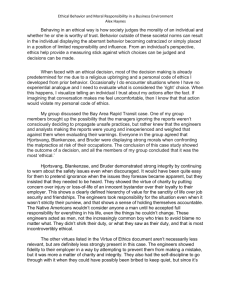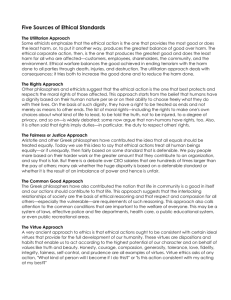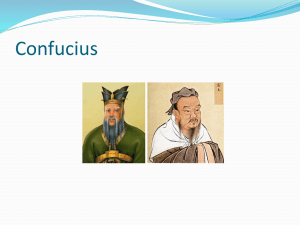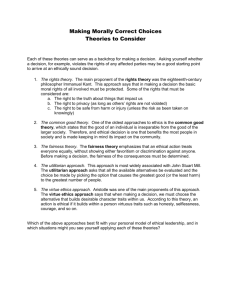What does ethics have to do with engineering?
advertisement
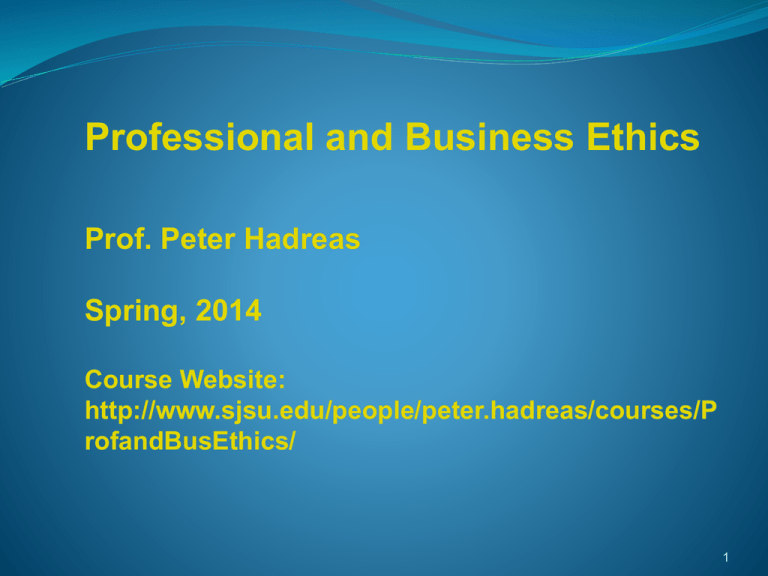
Professional and Business Ethics Prof. Peter Hadreas Spring, 2014 Course Website: http://www.sjsu.edu/people/peter.hadreas/courses/P rofandBusEthics/ 1 Three Basic Types of Ethical Theory Teleological, or consequence-based. (MBE, pp. 40-42) Deontological, or duty-based. (MBE, pp. 42-46) Virtue ethical, or character-based. (MBE, pp. 46-51) 2 But why seek virtues such as self-control, courage, fairness, and wisdom? The answer applies to the question raised at the beginning of this section on virtue ethics. Why would one want to be a ‘good person’ Aristotle’s and as we’ll later see Confucius’ answer is the same: The Virtuous life is the happy and fulfilled life. 3 But why seek virtues such as self-control, courage, fairness, and good-temper? But why is virtuous life the happy and fulfilled life. The answer to this question depends on the second question raised at the beginning of this section: Why should virtue ethics be particularly relevant to ‘professional community?’ 4 But why seek virtues such as self-control, courage, fairness, and good-temper? Within a community, where people know who you are (and know your character), character virtues both serve the community and at the same time keep you on a course in which you are more likely to have a happy, fulfilled life. Why? 5 But why seek virtues such as self-control, courage, fairness, and wisdom? The virtue of Good-temper means you stand up for yourself. It protects your own reputation and also allow you to neither be so meek as to be overlooked by others, nor offends others because of a rash temper. The virtue of Courage protects people in the community and at the same time wins their respect. Loyalty (a virtue) supports cooperative community projects. Since it’s neither obsequious or indifferent, it is a ‘thoughtful’ loyalty, neither blind obedience nor a sullen lack of interest in cooperation. 6 But why seek virtues such as self-control, courage, fairness, and wisdom? The virtue of Self-control supports your accomplishing your goals and at the same time reduces conflicts with others in the community. The virtue of Responsible Money-Management enables you to care for your own financial welfare as well as those who are dependent upon you. The virtue of Self-respect allows you to fairly promote yourself. Over time, you also gain the respect of your community because you’re neither too humble nor unduly ambitious, but present yourself fairly. 7 But why seek virtues such as self-control, courage, fairness, and good-temper? Answer: The life of virtue leads to the realization of one’s personal goals, wins community respect and benefits the community. So the virtuous life leads to the happy or fulfilled life. 8 THE DISCLOSURE RULE. Since the virtuous life serves both the individual and communally, then it should make sense why the textbook authors, Nelson and Treviño arrive at a “disclosure rule” for testing of decision-making: “A useful decision-making shortcut based on the broader community as a guide is known as the disclosure rule. This practical shortcut is widely used by managers and executives. The disclosure rule asks, ‘How would you feel if your behavior appeared on _______. You fill in the blank of a particular media outlet. Is it the front page of the New York Times, the Wall Street Journal, your home town newspaper, 60 Minutes, CNN? Treviño and Nelson textbook, Chapter 2, p. 50. 9 PLEASE NOTE Selections from Confucius’ Analects are available at the course website. http://www.sjsu.edu/people/peter.hadreas/courses/ProfandB usEthics/ These selections will be referred to in the lecture and discussion of Confucian ethics. 10 Confucius Kǒng fū zǐ, trans.: ‘Master Kong’ (traditionally 551 BC – 479 BC.) 11 12 13 14 Confucianism continued Virtue #3 ‘jen,’ ‘humaneness’, fully realized is in sympathy with Heaven and Earth “Only those who are absolutely sincere can fully develop their nature. If they can fully develop their nature, they can then fully develop the nature of others. If they can fully develop the nature of others, they can then fully develop the nature of things. If they can fully develop the nature of things, they can then assist in the transforming and nourishing process of Heaven and Earth. If they can assist in the transforming and nourishing process of Heaven and Earth, they can thus form a trinity with Heaven and Earth.” Confucius, The Doctrine of the Mean, #22, in Chan, Wing-Tsit, A Source Book in Chinese Philosophy, (Princeton, NJ: Princeton University Press, 1963), p. 107-8. 15 Virtue #3, ‘jen’ ‘compassion’ continued The person who has ‘jen’ (humaneness)’ will be a natural leader and will be willingly followed by people without force or coercion. See Analects 2:1, 2:3, 2:19, 12:19. QUESTION The Confucian tradition retains cultural power in the Far East, not only in China but also in cultures influenced by China such as Japan, Korea and South East Asia. Given the Confucian heritage, how do you think business relations will stand in relation to the ‘rule of law’ as compared with bonds of family and social commitments? 16 Confucianism Becoming Virtuous: Strive to be like the Ideal Person Confucius exhorts all people to strive for the ideal of a "gentleman" or "perfect man” (jūnzǐ). ”The perfect man" or “superior man” is one who "combines the qualities of saint, scholar, and gentleman." (The masculine gender is traditional and is still used.) The opposite person is the “small person” or “inferior man” (xiǎorén) who is petty, narrowly self-interested, greedy, and superficial, See Analects: 2:14, 4:11, 5:15, 12:19, 16:7, 16:10. QUESTION In the Analects 12:19 Confucius says, “The nature of the Superior Man is like the wind, the nature of the inferior man is like the grass. When the wind blows over the grass, it always bends.” What does this metaphor suggest about the individuality versus the universality of the Superior Man? 17 Dwight Perkins on ‘Chinese Way of Doing Business:’ “Where networks do not already exist, Chinese businesses spend time and resources trying to develop them, even across ethnic lines. A standard statement about business practices in China is that Americans and European businessmen show up with their lawyers and try to write and negotiate formal contracts that cover all contingencies. Chinese businessmen, in contrast, are prepared to spend years visiting, entertaining, and getting to know the foreigners before they are prepared to get down to carrying out actual transactions with or without formal contracts.” From Perkins, Dwight H., “Laws, Family Ties, and the East Asian Way of Business,” in Culture Matters, Harrison, Lawrence E., and Huntington, Samuel P, (Eds.) (New York: Basic Books, 2000), p. 238. Dwight Perkins directed the Harvard Institute for International Development from 1980 to 1995. 18 “Guanxi” Upper character: Behind the door, i. e. hidden. Lower character: Man facing a complex, i. e. a relationship 19 Lucian W. Pye on ‘Asian Values: ‘Guanxi’ “In the case of Chinese culture, the bonds of family extend outward to the clan and then onto more general ties of guanxi, or personal connections based on shared identities. What is most significant about the Chinese practices of guanxi for economic development is that parties are expected to share mutual obligations even though they may not know each other well. It is enough that they were classmates or schoolmates, came from the same town or even province, belonged to the same military outfit, or otherwise had a common element in their background.” From Pye, Lucian W., “’Asian Values’: From Dynamos to Dominoes?” in Culture Matters, Harrison, Lawrence E., and Huntington, Samuel P, (Eds.) (New York: Basic Books, 2000), p. 251. Lucian Pye is former president of American Political Science Association and edited or authored twenty-seven books. 20 A False Dichotomy Ethical Relativism versus Ethical Imperialism Discussed in Treviño and Nelson textbook, p. 415. 21 Ethical Relativism No culture has a better ethics than any other. (Discussed in textbook, p. 415ff.) Inadequacy of Ethical Relativism I. Exaggerates differences between societies. II. Undermines moral criticism. III. Denies moral progress. IV. Implies that the majority is always right. V. Typically falsified by actual behavior of ethical relativist. Why are Cultural Differences Important in thje Following Scenario? A large U. S. computer-products company in 1993 introduced a course on sexual harassment in its Saudi Arabian facility. Instructors used the same approach as they used with U. S. managers: the participants were asked to discuss a case in which a manager makes sexually explicit remarks to a new female employee over drinks in a bar.1 Why was this training session a dismal failure? 1. Adapted from Donaldson and Werhane, Ethical Issues in Business, 1999, p. 432. Why are Cultural Differences Not Important in the Nestlé’s Notorious Marketing Program In the 1970s and 1980s, the Swiss conglomerate Nestlé marketed infant formula to mothers in Third World countries. Nestlé advertised that bottle-fed babies were healthier. They used women, dressed as nurses, who were actually sales representatives receiving a commission to sell the formula. The formula needed to be mixed with water to be used. And it needed to be bought repeatedly by the mothers to continue bottle-feeding. The marketing campaign produced a health disaster.1 1. Adapted from textbook, p. 422-3. Why Not Culturally Relative? In the early 1990s a group of investors wanted to restore the SS United States, once a luxurious ocean liner. The restoration required stripping the ship of its asbestos lining. The bid from a U. S. company, based on U. S. standards for asbestos removal, was prices at more than $100 million. A company in the Ukranian city of Sevastopol offered to do the job for less than $2 million. In October, 1993, the ship was towed to Sevastopol. 1. Adapted from Donaldson and Werhane, Ethical Issues in Business, 1999, p. 432. Ethical Imperialism: The view that there are absolute ethical principles that demand exactly the same behavior in every society . (Discussed in Treviño and Nelson textbook, p. 415.) 27 Inadequacy of Ethical Imperialism Cultures vary. Some ways in which cultures vary include emphases on long-term versus short-term goals, conceiving people individualistically as opposed to conceiving people as parts of families or clans, and the acceptance of the behavior of powerful people simply because they are powerful people. These variations make it appear as if the ethics of different business practices, for example, bribery, nepotism, and employee loyalty, vary culture by culture. There are seldom a difference in core ethical values. The different culture practices create the appearance of differences in core values. 28 Geert Hofsteder on ‘Confucian Dynamism’ “In practical terms confucianism refers to a longterm versus a short-term orientation in life”1 1. Hofstede, Geert, Culture's Consequences: Comparing Values, Behaviors, Institutions and Organizations Across Nations, 2nd Edition. 596 pages. Thousand Oaks CA: Sage Publications, 2001, hardcover, ISBN 08039-7323-3; 2003, paperback, ISBN 0-8039-7324-1, pp. 164-5. Long-term versus short-term orientation Long term orientation -persistence -ordering relationships by status and observing this order -thrift having a sense of shame Short term orientation -personal steadiness and stability -protecting your reputation -respect for tradition -reciprocation of greetings, favors, and gifts 1. http://www.clearlycultural.com/geert-hofstede-cultural-dimensions/long-termorientation/ Hofstede (2001), Culture’s Consequences, 2nd ed., p 359. “Long-Term Orientation, the fifth dimension of Hofstede was drawn from a value survey which was distributed across 23 countries. Geert Hofstede’s Long-Term versus Short-Term Index: China 118 Hong Kong 96 Taiwan 87 Japan 80 South Korea 75 Brazil 65 India 61 Thailand 56 Singapore 48 Netherlands Sweden Australia Germany New Zealand United States Ethiopia Kenya 25 Tanzania 25 44 33 31 31 30 29 25 United Kingdom 25 Zambia25 Norway 20 Philippines 19 Ghana 16 Nigeria 16 Sierra Leone 16 Adapted from Website: Making Sense of Cross Cultural Communication, http://www.clearlycultural.com/geert-hofstedecultural-dimensions/long-term-orientation/ Japan scores a relatively high ‘80’ on the longterm versus short-term index. This would fit with Japanese firms investing in their employees’ training and development. Typically, new employees will train on average for six to twelve months in each of the firm’s major offices or divisions so that within a few years they know many facets of the company’s operations. Reid, Steven, “The Business of Culture: How Culture Affects Management Around the World,” Oct. 4, 2010, http://www.hrmtoday.com/culture/corporate-culture/the-businessof-culture-how-culture-affects-management-around-the-world/ accessed March 9, 2011. Individualism “Individualism represents the extent to which people in a society think of themselves as autonomous individuals who are responsible primarily to themselves and their immediate families. . . . Americans, Canadians, Australians and most Northern Europeans are individualists. They define themselves in terms of personal characteristics and achievement, and they generally value personal welfare over group harmony.” (Treviño and Nelson textbook, p. 403.) Geert Hofstede’s Individualism/Collectivism Index: United States 91 Australia 90 United Kingdom 89 Netherlands 80 New Zealand 79 Italy 76 Belgium 75 Denmark 74 France 71 Sweden 71 Ireland 70 Norway 69 Switzerland 68 Germany 67 South Africa 65 Finland 63 Poland 60 Czech Republic 58 Austria 55 Hungary 55 Israel 54 Spain 51 India 48 Argentina 46 Japan 46 Iran 41 Jamaica 39 Brazil 38 Egypt 38 Iraq 38 Kuwait 38 Lebanon38 Libya 38 Saudi Arabia 38 United Arab Emirates 38 Turkey 37 Uruguay 36 Greece Philippines Mexico Ethiopia Kenya Portugal 27 Tanzania27 Zambia Malaysia26 Hong Kong Chile China 35 32 30 27 27 27 25 23 20 Ghana 20 Nigeria 20 Sierra Leone 20 Singapore 20 Thailand 20 El Salvador 19 South Korea 18 Taiwan 17 Peru 16 Costa Rica 15 Indonesia 14 Pakistan 14 Colombia 13 Venezuela 12 Panama 11 Ecuador 8 Guatemala 6 An individualist – collectivist tragedy? “A federal prison camp inmate spoke with Penn State students about the reason for his imprisonment. The man, who was welleducated and well-spoken, had been a successful New York executive. He and his wife had helped the wife’s nephew by providing a place for him to stay when he was having difficulties in his life, including drug use. But it turned out that the nephew was using their telephone to sell drugs right out of their home! The couple was accused of knowing about and supporting drug dealing, and they were charged with conspiracy. Both were convicted and sentenced to many years in prison. Asian students in the audience were horrified that this man was in prison for helping his nephew.” (Treviño and Nelson textbook, p. 404.) Collectivism “Most Asian and Latin American countries represent collectivist societies. They value conformity to the group and define themselves in terms of their group memberships and their contributions to the success of those groups.” (Treviño and Nelson textbook, p. 403.) A Japanese businessman wants to tell his Swedish client that he is uninterested in a particular sale. So he says "That will be very difficult." The Swede eagerly asks how he can help. The Japanese is mystified. To him, saying that something is difficult is a polite way of saying ‘No way in hell!.’ What’s ‘individualistic’ or ‘collectivist’ about the Swedish and the Japanese man’s response? Scenario downloaded from http://www.analytictech.com/mb021/cultural.htm QUESTION How might family loyalty become confused with conflict of interest depending upon whether a culture is individualistic or collectivist? Conflict of interest defined: “In an organization, a conflict of interest arises when employees at any level have special or private interests that are substantial enough to interfere with their job duties; that is, when their personal interests lead them, or might reasonably be expected to lead them, to make decisions or act in ways that are detrimental to their employer’s interests.”1 1. Shaw, William H., and Barry, Vincent, Moral Issues in Business, 10th Edition (Belmont CA: Wadsworth, 2007), p. 389. Power Distance “Power distance is the extent to which less powerful members of institutions and organizations within a country expect and accept that power is distributed unequally.”1 In countries with high power distance employees are often afraid to express their doubts and disagreements with their autocratic and paternalistic bosses. In countries with small power distance, bosses and subordinates work closely together and consult each other. Subordinates and superiors consider each other as or less equal . Subordinates expect to be consulted within the decision-making process. 1. http://www.via-web.de/power-distance/ Geert Hofstede: Geert Hofstede’s Power Distance Index: Malaysia 104 Guatemala 95 Panama 95 Philippines 94 Mexico 81 Venezuela 81 China 80 Egypt 80 Iraq 80 Kuwait 80 Lebanon 80 Libya 80 Saudi Arabia 80 United Emirates 80 Ecuador 78 Indonesia 78 Ghana 77 India 77 Nigeria 77 Sierra Leone Singapore Brazil 69 France 68 Hong Kong Poland 68 Colombia El Salvador Turkey 66 Belgium 65 Ethiopia 64 Kenya 64 Peru 64 Tanzania 64 Thailand 64 Zambia 64 77 74 68 67 66 Chile 63 Portugal 63 Uruguay 61 Greece 60 South Korea 60 Iran 58 Taiwan 58 Czech Republic 57 Spain 57 Pakistan 55 Japan 54 Italy 50 Argentina 49 South Africa 49 Hungary 46 Jamaica 45 United States 40 Netherlands 38 Australia 36 Costa Rica 35 Germany 35 United Kingdom Switzerland 34 Finland 33 Norway 31 Sweden 31 Ireland 28 New Zealand 22 Denmark 18 Israel 13 Austria 11 Adapted from Website: Making Sense of Cross Cultural Communication, http://www.clearlycultural.com/geert-hofstedecultural-dimensions/ 35 QUESTIONS 1.How would whistle-blower behavior vary according to power distance? 2. If an employee in a high power distance culture wants help with work related problem, how might the ‘chain of command’ in the organization play into the request for help? Citations for pictures in previous powerpoint: 1. Slide #11, picture of Confucius, en.wikipedia.org/wiki/File:Confucius_Tang_Dynasty.jpg http://www.google.ca/search?q=picture+of+Monarch+Butterflies+in+Santa+Cruz&tbm 2. Slide #12, picture of Confucius, en.wikipedia.org/wiki/File:Confucius_Tang_Dynasty.jpg 3. Slide #13, picture of Confucucius, http://www.all-famousquotes.com/images/uploads/confucius1.jpg. 4. Slide #14, pictiure of Confucius, http://blogs.reuters.com/wpcontent/uploads/2006/09/confucius300.jpg. 5. Slide #15, picture of Confucius, http://1.bp.blogspot.com/_UCX9YZuA81Q/TQ1kFei9aI/AAAAAAAAACU/RzZUTE7fXQw/s1600/dragon%2B2.jpg 43


